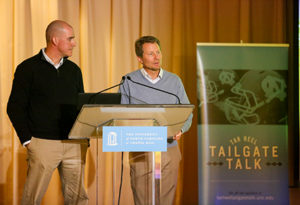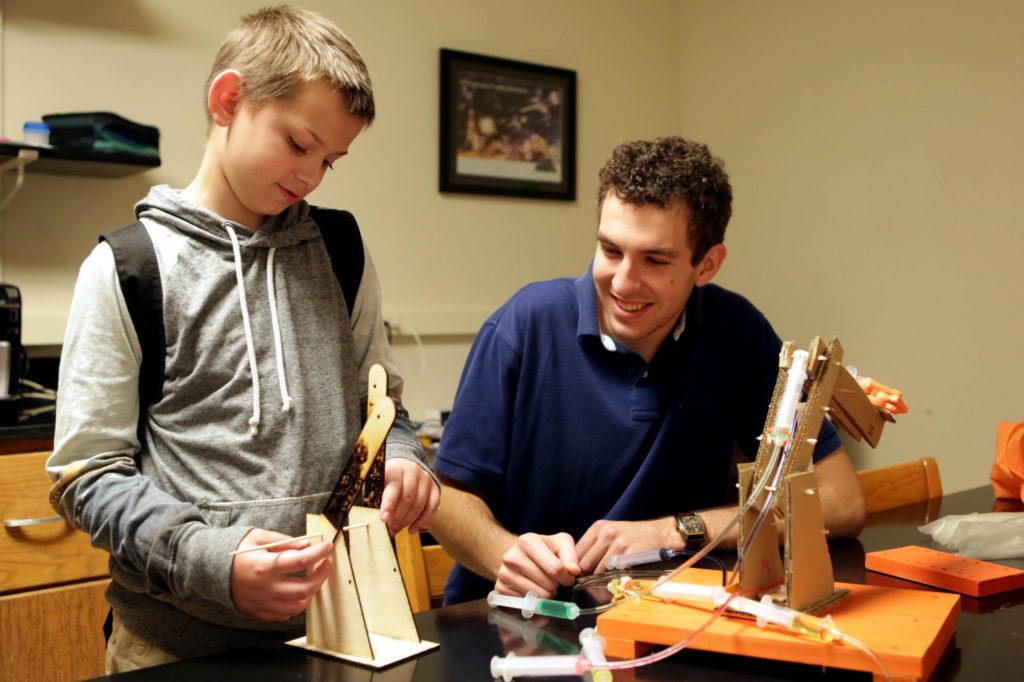
Watch Kevin Guskiewicz on the Nov. 15 CBS “60 Minutes” episode on “Football and the Brain.”
Concussions on the playing field may steal the news headlines, but head trauma isn’t just an issue for athletes — it can be a life-or-death situation for members of the military, as well.
As the injury impairs and affects a soldier’s vision, and the trauma can quickly reduce their ability to assess what is happening on the battlefield.
“We don’t have to worry about blasts on football fields or soccer fields, but it’s a component of head trauma that the military has to be worried about,” said Jason Mihalik, assistant professor in the College of Arts and Sciences’ Department of Exercise and Sport Science.
Understanding how concussions affect the body and how research is working to better protect people from effects of the harmful trauma was the topic of this season’s Tar Heel Tailgate Talk series finale Nov. 14.
The talks, which were held before home games this season, highlighted the intersection of academics and athletics.
“We have so many accomplishments that our faculty have made in service to society and to the state,” said Bruce Cairns, chair of the faculty. “That’s really what these talks reflect — an opportunity for our community to hear some of the real advances and impact that people are making across the nation.”
Co-directors of the Matthew Gfeller Sport-Related TBI Research Center, Mihalik and Kevin Guskiewicz, closed out this year’s lecture series by teaming up to present a complete picture of what research at University of North Carolina at Chapel Hill is focusing on. Guskiewicz also is Dean-designate of the College of Arts and Sciences.
“Innovative science can be a game changer,” Mihalik said. “We have done things over the last decade and a half to innovate our science into things that society can use every day.”
While researchers are working to better understand how concussions and repeated concussions affect the brain, there are currently more unknowns than knowns.
“It’s one of the very few injuries we treat as sports medicine clinicians that we can’t see on an image,” said Guskiewicz, a neuroscientist and internationally recognized expert on sport-related concussions. “We are beginning to develop those technologies here.”
At Carolina, Guskiewicz has dedicated much of his research to understanding how to prevent young athletes from receiving concussions on the field. One facet of his work consists of using accelerometers in helmets of high school football players. Through this, he has been able to track how modifying coaching methods can reduce risks.
“We’re really going to change the way they’re blocking and tackling to see if that intervention can perhaps be a game changer in improving safety in youth sports,” he said.
Although helmets prevent a majority of severe traumatic brain injuries, Guskiewicz said, they don’t completely protect the athletes — and the technology to create concussion-proof equipment doesn’t yet exist.
The key to reducing concussions will be a change of culture and modifying behavior, he added.
“Culture change takes a long time,” Guskiewicz said. “Kids didn’t wear bicycle helmets 20 years ago, but they do now. It takes a generation to change that culture. We’re trying to figure out ways that we can expedite the learning curve.”
Although much of the research on concussions is done in the sports world, Mihalik has been taking the same information and technologies to study how the brain trauma is affecting service members.
While the impairments can mean little impact in a normal person’s daily life, for the elite group of soldiers he works with the consequences can be significant. By addressing concussion risks and treatment of service members, Mihalik’s work can help improve force readiness.
“For us, ‘not right’ means we can’t focus in a classroom or maybe we don’t see the pass as effectively,” he said. “’Not right’ for them is the difference between a hostage and a hostage taker in an operation. It’s a very big issue.”
By Brandon Bieltz, UNC Office of Communications and Public Affairs


